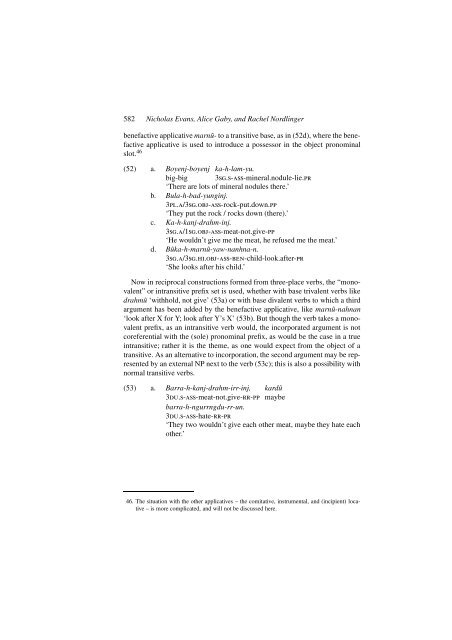Valency mismatches and the coding of reciprocity in ... - Linguistics
Valency mismatches and the coding of reciprocity in ... - Linguistics
Valency mismatches and the coding of reciprocity in ... - Linguistics
You also want an ePaper? Increase the reach of your titles
YUMPU automatically turns print PDFs into web optimized ePapers that Google loves.
582 Nicholas Evans, Alice Gaby, <strong>and</strong> Rachel Nordl<strong>in</strong>ger<br />
benefactive applicative marnû- to a transitive base, as <strong>in</strong> (52d), where <strong>the</strong> benefactive<br />
applicative is used to <strong>in</strong>troduce a possessor <strong>in</strong> <strong>the</strong> object pronom<strong>in</strong>al<br />
slot. 46<br />
(52) a. Boyenj-boyenj ka-h-lam-yu.<br />
big-big 3sg.s-ass-m<strong>in</strong>eral.nodule-lie.pr<br />
b.<br />
‘There are lots <strong>of</strong> m<strong>in</strong>eral nodules <strong>the</strong>re.’<br />
Bula-h-bad-yung<strong>in</strong>j.<br />
3pl.a/3sg.obj-ass-rock-put.down.pp<br />
‘They put <strong>the</strong> rock / rocks down (<strong>the</strong>re).’<br />
c. Ka-h-kanj-drahm-<strong>in</strong>j.<br />
3sg.a/1sg.obj-ass-meat-not.give-pp<br />
‘He wouldn’t give me <strong>the</strong> meat, he refused me <strong>the</strong> meat.’<br />
d. Bûka-h-marnû-yaw-nanhna-n.<br />
3sg.a/3sg.hi.obj-ass-ben-child-look.after-pr<br />
‘She looks after his child.’<br />
Now <strong>in</strong> reciprocal constructions formed from three-place verbs, <strong>the</strong> “monovalent”<br />
or <strong>in</strong>transitive prefix set is used, whe<strong>the</strong>r with base trivalent verbs like<br />
drahmû ‘withhold, not give’ (53a) or with base divalent verbs to which a third<br />
argument has been added by <strong>the</strong> benefactive applicative, like marnû-nahnan<br />
‘look after X for Y; look after Y’s X’ (53b). But though <strong>the</strong> verb takes a monovalent<br />
prefix, as an <strong>in</strong>transitive verb would, <strong>the</strong> <strong>in</strong>corporated argument is not<br />
coreferential with <strong>the</strong> (sole) pronom<strong>in</strong>al prefix, as would be <strong>the</strong> case <strong>in</strong> a true<br />
<strong>in</strong>transitive; ra<strong>the</strong>r it is <strong>the</strong> <strong>the</strong>me, as one would expect from <strong>the</strong> object <strong>of</strong> a<br />
transitive. As an alternative to <strong>in</strong>corporation, <strong>the</strong> second argument may be represented<br />
by an external NP next to <strong>the</strong> verb (53c); this is also a possibility with<br />
normal transitive verbs.<br />
(53) a. Barra-h-kanj-drahm-irr-<strong>in</strong>j, kardû<br />
3du.s-ass-meat-not.give-rr-pp<br />
barra-h-ngurrngdu-rr-un.<br />
3du.s-ass-hate-rr-pr<br />
maybe<br />
‘They two wouldn’t give each o<strong>the</strong>r meat, maybe <strong>the</strong>y hate each<br />
o<strong>the</strong>r.’<br />
46. The situation with <strong>the</strong> o<strong>the</strong>r applicatives – <strong>the</strong> comitative, <strong>in</strong>strumental, <strong>and</strong> (<strong>in</strong>cipient) locative<br />
– is more complicated, <strong>and</strong> will not be discussed here.

















